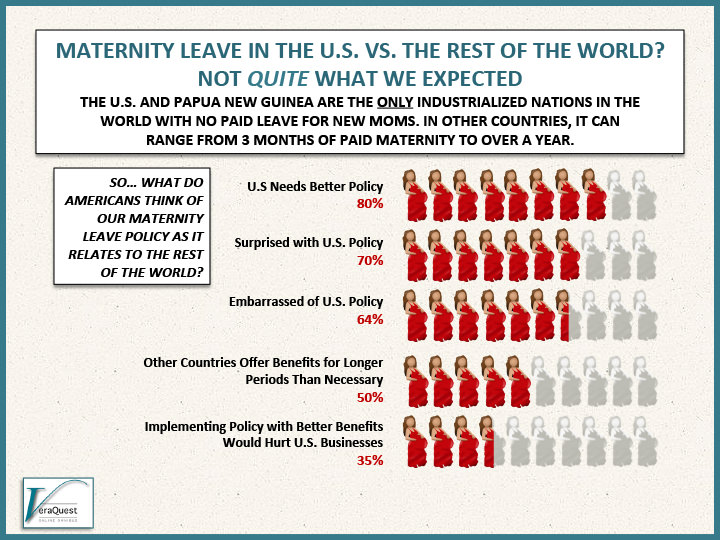New mothers in the U.S. (who work full-time at a company with at least 50 employees) can legally take up to 12 weeks of unpaid maternity leave, under the Family and Medical Leave Act. Based on results of a recent VeraQuest poll among 3,009 adults, the vast majority of Americans expect that these benefits are either on-par with (22%) or better than (52%) maternity leave benefits offered in other countries.
But data shows that, in actuality, the U.S. is among the countries that offer the fewest benefits for maternity leave. In fact, the U.S. and Papua New Guinea are the only industrialized nations in the world with no paid leave for new moms. In Mexico, new mothers get 3 months of paid maternity leave. New moms in countries like Spain, Greece, Australia, Iceland, and Belgium can get 4-7 months of paid maternity leave. Norway, U.K., France, Ireland, and Italy (among others) are in the 9-12 month range for paid maternity leave. And countries like Germany, Japan, Lithuania, Estonia, Finland, and others can offer over 1 year of paid leave for new moms.
So what do Americans think after hearing about other countries’ maternity benefits? Most (70%) say they are surprised about the U.S. policy compared to those in other countries, with almost two-thirds (64%) expressing embarrassment regarding our country’s maternity leave benefits.

After hearing about other countries’ policies, four-out-of-five Americans (80%) feel that the U.S. needs a better policy for maternity leave. Democrats and Republicans agree on this issue, albeit with greater consensus among the former (85% and 72%, respectively). Interestingly, only about one-third (35%) of Americans feel that implementing a policy with better benefits for new moms would hurt U.S. businesses.
So what should maternity leave benefits look like in the U.S.? For starters, the majority (71%) feel women should get paid maternity leave, rather than unpaid leave (25%). But beyond that aspect, Americans really aren’t looking to match the countries with the greatest benefits. In fact, half (50%) of Americans believe that some of these other countries offer benefits for a longer period of time than is necessary. Instead, the greatest consensus is for “paid leave for up to 3 months” (32%), followed by “paid leave for 4-6 months” (22%).
A friend and colleague, Bob Leitman, used to say “where someone stands is often based on where they sit”. As a small business owner, I know that paid maternity leave would put a tremendous strain on my company. Even if I owned a larger company and was better able to absorb the hit, I wonder how I’d feel. I’m slightly left of center on most social issues, but I have moved decidedly to the right on this topic as a result of women I know who’ve taken advantage of unpaid maternity by leaving their employers in the lurch (i.e., by extending their absence and/or by not returning to their job after their maternity leave concluded). Some were last-minute soul-searching choices, while others were more pre-meditated.
As the father of two young women who at some point may choose to have kids… I would want them to have the peace of mind that comes with having good maternity leave benefits; however, I think any paid maternity leave should come with the stipulation that an employer would be fully compensated for benefits paid if an employee decides not to return and/or returns for less than one or maybe two years.
Some companies currently offer maternity leave benefits beyond those required by the federal government…is yours one of them? Do you think companies should be required to offer paid leave for new moms?
Leave a Reply